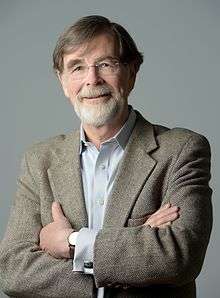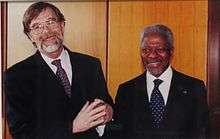Thomas G. Weiss

Thomas G. Weiss (born 1946) is a distinguished scholar of international relations and global governance with special expertise in the politics of the United Nations. He was named a 2016 Andrew Carnegie Fellow for a project exploring the concept of a world without the United Nations.[1] Since 1998, he has been Presidential Professor at the Graduate Center of the City University of New York, and is Director Emeritus of the Ralph Bunche Institute for International Studies.[2]
He is "one of the leading experts on the theory and practice of humanitarian intervention",[3] and is recognized as an authority on international organizations and the UN system.[4] Weiss adheres to the constructivist school, and advocates a position for intergovernmental organizations that goes beyond the anarchy of inter-state relations. He initiated the UN Intellectual History Project in 1999 to trace the origins and the evolution of key ideas about international economic and social development nurtured under UN auspices.[5] Weiss introduced the idea of the "Third United Nations", and directed the research team that popularized the concept of Responsibility to Protect (R2P). A firm believer in R2P, Weiss has argued in numerous works that a well-grounded interpretation of sovereignty does not preclude intervention in the face of mass atrocities. His oral history transcript is available on the UN Intellectual History Project website.[6]
Biography

Weiss received a BA from Harvard University and both a MA and PhD from Princeton University. He pursued advanced studies at the Graduate Institute of International Studies, Geneva. He held professional posts in the Office of the UN Commissioner for Namibia, the University Program at the Institute for World Order, the United Nations Institute for Training and Research, and the International Labour Organization. He served as a Senior Economic Affairs Officer at the United Nations Conference on Trade and Development in Geneva from 1975 until 1985.
After leaving UNCTAD, he became Executive Director of the International Peace Academy (now the International Peace Institute), until he left in 1989 to become Research Professor at Brown University and Associate Director of their Watson Institute for International Studies. He was also Executive Director of the Academic Council on the United Nations System (ACUNS) from 1992 and 1998, and co-director of the Humanitarianism and War Project. From 2012 to 2015, he was a Visiting Research Professor at SOAS, University of London.
Weiss was director of the Ralph Bunche Institute for International Studies from 2001 to 2014. For over forty years he has regularly taught, lectured, consulted on, and conducted research on a wide variety of issues in international relations.[7]
Contributions

He served as an advisory board member for the Global Centre for the Responsibility to Protect,[8] from 2007-2014 and sits on the editorial boards of Journal of Intervention and Statebuilding,[9] Third World Quarterly,[10] Global Governance,[11] and Global Responsibility to Protect.[12] He is also co-editor of Routledge's "Global Institutions Series". His prior positions include:
- Director of the United Nations Intellectual History Project, with Louis Emmerij and Richard Jolly, 1999-2010. In addition to overseeing seventeen volumes and 80 oral histories of ideas in the United Nations, the three directors notably introduced the idea that there are "three United Nations."[13]
- Research Director of the International Commission on Intervention and State Sovereignty, 2000-2002. This initiative popularized the concept of the "responsibility to protect," and Weiss co-authored the supplementary volume—which traced the ethics, assessed the operational mechanics, and analyzed the political dimensions of the undertaking—that accompanied the final report of the commission.
- President of the International Studies Association, the preeminent professional association of scholars of international politics, 2009–2010, and recipient of its 2016 International Organization Distinguished Scholar Award.
- Chair of the Academic Council on the United Nations System, 2007-2009.
- Editor, Global Governance, 2000-2005.
Academic work
Weiss has authored or edited 55 books and 250 articles and book chapters. His current research focuses on the Future UN Development System[14] and on the Wartime United Nations.[15] His research interests focus primarily on the United Nations, global governance, humanitarianism, human rights, the Responsibility to Protect doctrine, and the power of ideas in shaping world order. Weiss's books from the 21st century include (most recent editions are listed):
- Weiss, Thomas G.; Forsythe, David P.; Coate, Roger; Kelly-Kate Pease (2016), The United Nations and Changing World Politics, Eighth Edition, [Westview Press], ISBN 9780813349787, https://westviewpress.com/books/the-united-nations-and-changing-world-politics/.
- Weiss, Thomas G. (2016), What's Wrong With the United Nations and How to Fix It, Third Edition, [Wiley], ISBN 978-1-5095-0743-6, http://www.wiley.com/WileyCDA/WileyTitle/productCd-1509507434.html.
- Weiss, Thomas G. (2016), Humanitarian Intervention: Ideas in Action, Third Edition, [Polity Press], ISBN 9781509507320, http://www.polity.co.uk/book.asp?ref=9780745659800.
- Weiss, Thomas G.; Abdenur, Adriana Erthal, eds. (2016), Emerging Powers and the UN: What Kind of Development Partnership?, [Routledge], ISBN 9781138947320, https://www.routledge.com/products/9781138947320.
- Plesch, Dan; Weiss, Thomas G., eds. (2015), Wartime Origins and The Future United Nations, [Routledge], ISBN 978-0415712675, http://www.sponpress.com/books/details/9780415712675/. For interview see https://soundcloud.com/siriusxm-news-issues/thomas-weiss-wartime-origins-and-the-future-united-nations.
- Weiss, Thomas G. Governing the World? Addressing "Problems without Passports" (2014), [Paradigm], ISBN 978-1-61205-628-9, http://www.paradigmpublishers.com/Books/BookDetail.aspx?productID=393776
- Weiss, Thomas G.; Browne, Stephen, eds. (2014), Post-2015 UN Development: Making change happen [Routledge], ISBN 978-1-135-07361-9, http://www.routledge.com/books/details/9780415856638/.
- Weiss, Thomas G.; Serrano, Monica, eds. (2014),The International Politics of Human Rights: Rallying to the R2P C-use? [Routledge], ISBN 978-0-415-62634-7, http://www.routledge.com/books/details/9780415626347/.
- Weiss, Thomas G.; Wilkinson, Rorden, eds. (2014), International Organization and Global Governance, [Routledge], ISBN 978-0-415-62760-3.
- Weiss, Thomas G. (2013), Global Governance: Why? What? Whither, [Polity Press], ISBN 978-0745660462, http://www.polity.co.uk/book.asp?ref=9780745660455.
- Weiss, Thomas G. (2013), Humanitarian Business, [Polity Press], ISBN 978-0-7456-6332-6, http://www.polity.co.uk/book.asp?ref=9780745663319.
- Barnett, Michael; Weiss, Thomas G. (2011), Humanitarianism Contested: Where Angels Fear to Tread, [Routledge], ISBN 978-0415496636, http://www.routledge.com/books/details/9780415496643/.
- Mani, Rama; Weiss, Thomas G., eds. (2011), Responsibility to Protect: Cultural Perspectives in the Global South, Routledge, ISBN 978-0415781855, http://www.routledge.com/books/details/9780415781855/.
- Weiss, Thomas G. (2011), Thinking about Global Governance, Why People and Ideas Matter, Routledge, ISBN 978-0415781930, http://www.routledge.com/books/details/9780415781930/.
- Weiss, Thomas G.; Thakur, Ramesh (2010), Global Governance and the UN: An Unfinished Journey, Indiana University Press, ISBN 978-0253221674, http://www.iupress.indiana.edu/product_info.php?products_id=145358.
- Boulden, Jane; Thakur, Ramesh; Weiss, Thomas G., eds. (2009), The United Nations and Nuclear Orders, [United Nations University Press], ISBN 978-9280811674, https://unp.un.org/bookshop/details.aspx?sku=9789280811674.
- Jolly, Richard; Emmerij, Louis; and Weiss, Thomas G. (2009), UN Ideas That Changed the World, [Indiana University Press], ISBN 978-0253221186, http://www.iupress.indiana.edu/product_info.php?products_id=95548.
- Barnett, Michael; Weiss, Thomas G., eds. (2008), Humanitarianism in Question: Politics, Power, Ethics, [Cornell University Press], ISBN 978-0801473012, http://www.cornellpress.cornell.edu/book/?GCOI=80140100666490.
- Weiss, Thomas G.; Daws, Sam, eds. (2007), The Oxford Handbook on the United Nations [Oxford University Press], ISBN 978-0199560103, http://www.oxfordhandbooks.com/view/10.1093/oxfordhb/9780199560103.001.0001/oxfordhb-9780199560103.
- Weiss, Thomas G.; with Korn, David A. (2006) Internal Displacement: Conceptualization and Its Consequences, Routledge, ISBN 978-0415770804, http://www.routledge.com/books/details/9780415770798/.
- Hoffman, Peter J.; Weiss, Thomas G. (2006), Sword & Salve: Confronting New Wars and Humanitarian Crises, [Rowman & Littlefield], ISBN 978-0742539778.
- Weiss, Thomas G. (2004), Military-Civilian Interactions: Humanitarian Crises and the Responsibility to Protect, Second Edition, Rowman & Littlefield, ISBN 978-0742530171.
- Weiss, Thomas G.; Caryannis, Tatiana; Emmerij, Louis; and Jolly, Richard (2005), UN Voices: The Struggle for Development and Social Justice, [Indiana University Press], ISBN 978-0253346421, http://www.iupress.indiana.edu/product_info.php?products_id=22228.
- Weiss, Thomas G., Crahan, Margaret E.; Goering, John, eds. (2004), Wars on Terrorism and Iraq: Human Rights, Unilateralism, and U.S. Foreign Policy, [Routledge], ISBN 978-0415700634, http://www.routledge.com/books/details/9780415700634/.
- Boulden, Jane; Weiss, Thomas G., eds. (2004), Terrorism and the UN: Before and After September 11, Indiana University Press, ISBN 978-0253216625, http://www.iupress.indiana.edu/product_info.php?products_id=21665.
- Weiss, Thomas G., Hubert, Don (2002) The Responsibility to Protect: Research, Bibliography, Background, [International Development Research Centre], ISBN 978-0889369634, http://web.idrc.ca/en/ev-9439-201-1-DO_TOPIC.html.
- Louis Emmerij; Jolly, Richard; and Weiss, Thomas G. (2001), Ahead of the Curve?: UN Ideas and Global Challenges, [Indiana University Press], ISBN 025321467X, http://www.iupress.indiana.edu/product_info.php?products_id=21187.
- Aall, Pamela; Miltenberger, Daniel; Weiss, Thomas G. (2000), Guide to IGOs, NGOs, and the Military in Peace and Relief Operations, [US Institute of Peace], ISBN 978-1929223053.
Lectures, talks, and interviews
- In November 2016, the semi-annual publication of the entire City University of New York System was devoted to faculty award recipients. “Salute to Scholars” featured me and the award on pp. 56-57, also available at http://www2.cuny.edu/wp-content/uploads/sites/4/page-assets/news/publications/includes/salute-to-scholars/Salute-to-Scholars-Faculty-Awards-2016.pdf.
- "As UN Secretary General, Ban Ki-moon is toward the Bottom", The Hankyoreh, 20 June 2016, http://english.hani.co.kr/arti/english_edition/e_international/748952.html.
- Thomas G. Weiss and Stephen Browne wrote for MUNPlanet about the challenges that lay ahead the post-2015 development agenda. Whither Post-2015 UN Development?
- "United Nations is very cost-effective", SNBC, 18 November 2015, http://video.cnbc.com/gallery/?video=3000456012.
- "Humanitarian Business", Center for Global Ethics and Politics, 20 February 2014, http://cgep.ws.gc.cuny.edu/cgep-video/thomas-g-weiss/.
- ISA's Presidents Series, International Studies Association, 2010, http://www.isanet.org/Programs/PRC/Short-Term-Release-2.
References
- ↑ "Announcing the 2016 Andrew Carnegie Fellows".
- ↑ "Ralph Bunche Institute for International Studies".
- ↑ "Lawrence D. Friedman, Review, 'Humanitarian Intervention: Ideas in Action,' Foreign Affairs, Mar/Apr 2008". https://www.foreignaffairs.com/reviews/capsule-review/2008-03-02/humanitarian-intervention-ideas-action. External link in
|publisher=(help); - ↑ "G. John Ikenberry, Review, "What's Wrong With the United Nations and How to Fix It," Foreign Affairs, Mar/Apr 2009". https://www.foreignaffairs.com/reviews/capsule-review/2009-03-01/what-s-wrong-united-nations-and-how-fix-it. External link in
|publisher=(help); - ↑ "United Nations Intellectual History Project".
- ↑ http://www.unhistory.org/CD/PDFs/Weiss.pdf
- ↑ "Thomas G. Weiss, lecture titled "Humanitarian Business" at Center for Global Ethics and Politics".
- ↑ "About the Global Centre for the Responsibility to Protect". http://www.globalr2p.org/about_us#iab. Retrieved 2013-01-30. External link in
|publisher=(help) - ↑ "Journal of Intervention and Statebuilding Editorial Board". http://www.tandfonline.com/action/aboutThisJournal?show=editorialBoard&journalCode=risb20. Retrieved 2013-01-30. External link in
|publisher=(help) - ↑ "Third World Quarterly Editorial Board". http://www.tandfonline.com/action/aboutThisJournal?show=editorialBoard&journalCode=ctwq20. Retrieved 2013-01-30. External link in
|publisher=(help) - ↑ "Global Governance Editorial Board". https://www.rienner.com/GGedboard. External link in
|publisher=(help); - ↑ "Global Responsibility to Protect Editorial Board". http://www.brill.com/global-responsibility-protect. Retrieved 2013-01-30. External link in
|publisher=(help) - ↑ G. John Ikenberry. "Review, 'UN Ideas That Changed the World,'". Foreign Affairs , Nov/Dec 2009. Retrieved 2013-01-30.
- ↑ "Future United Nations Development System".
- ↑ Ralph Bunche Institute for International Studies. "The Future UN and Wartime History".
External links
- Thomas G. Weiss and Roden Wilkinson's article "Rethinking Global Governance? Complexity, Authority, Power, Change" was the most cited piece in International Studies Quarterly
- Thomas G. Weiss's faculty profile at City University of New York.
- The United Nations Intellectual History Project website
- The FP Survey: The United Nations, "an exclusive poll of top experts" that includes Thomas G. Weiss
- SOAS, University of London, Centre for International Studies and Diplomacy (CISD)
- Future United Nations Development System (FUNDS) Project